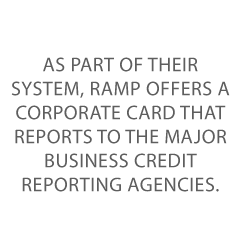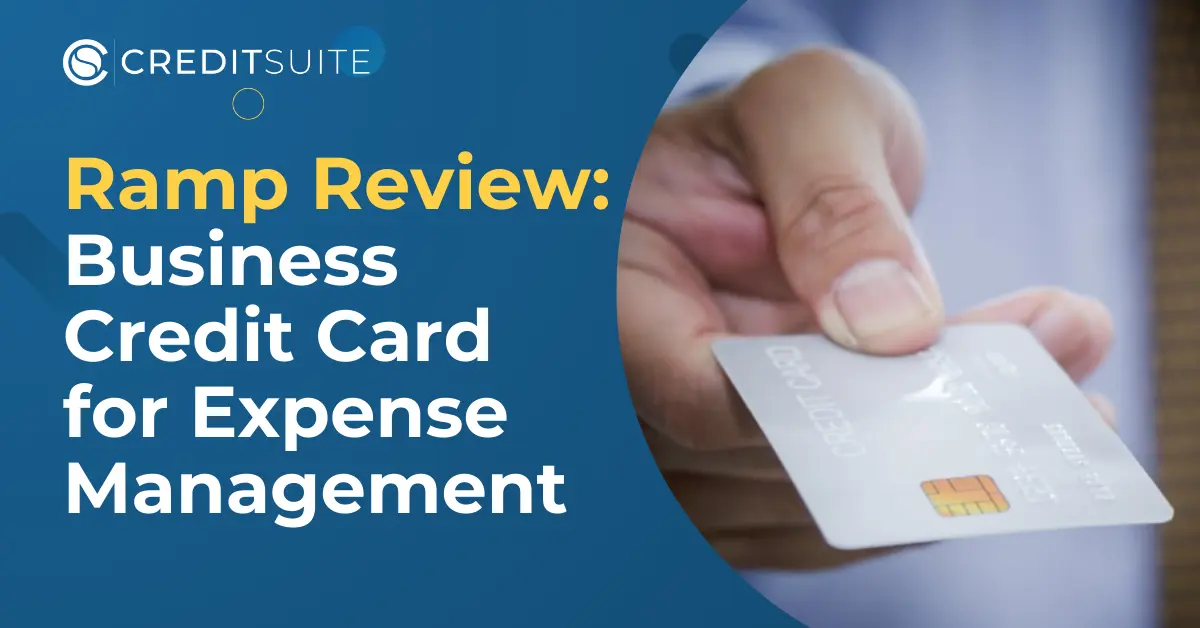Ramp is, at its core, a money management system. The focus is on helping business owners save money by offering ways to manage company spending by employees and streamline financial processes. Our Ramp review can help you make a good decision.
This focus on reducing spending is unique to them. In fact, according to Ramp, “Businesses that use Ramp save an average of 3.3% in their first year and close their books 8x faster than before.” Other similar systems offer incentives and rewards for spending more.
This blog post may contain affiliate links, meaning when you click the links for some products and make a purchase, Credit Suite receives a commission at no additional cost to you.
The Ramp Corporate Card
As part of their system, Ramp offers a corporate card that reports to the major business credit reporting agencies.
That means in addition to managing funds, you can use Ramp to build your business credit score. They offer both unlimited virtual cards and physical cards.
Unique Features of the Ramp Corporate Card
The ability to personalize individual cards with your brand.
The ability to restrict or limit the amount spent with a specific vendor, either on one card or company wide
Limit or restrict spending in specific categories, like dining, travel, and more.
Set limits on cards to refresh when you want them to, even daily.!
Set restrictions and limits at the transaction level, with the flexibility to ask for approval as needed, to better control spending on big ticket items
Ability to access an unlimited number of cards allows for providing employees with their own corporate credit card, and even creating multiple virtual cards if needed
Ramp Corporate Card Requirements for Approval
To be approved for a Ramp card, a business must meet these qualifications:
- Be registered in the United States
- Be incorporated, not operating as a sole proprietor or other unregistered business type
- Have a minimum business cash balance of $75,000 in a US business bank account
- Majority of operations and corporate spend in the US
Note: They do support international transactions and will waive all related transaction fees, according to their website.
Additionally, applicants must have an EIN and provide it on the application. You can apply without an SSN if you do not have one.
You’ll need a copy of your foreign passport and documentation to prove your address, such as a utility bill, bank statement, pay stub, etc.
They do not require a personal guarantee. They consider the financial health of the business using factors such as the cash balance of the company, cash flows, and revenue.
Pros for the Ramp Corporate Card
The fact that there is no personal guarantee requirement is a huge benefit. Add that to the fact that there is no credit check, and you have a great deal.
Other Ramp Corporate Card benefits include:
- No credit check
- Doesn’t report to the personal credit bureaus
- Reports to major business credit reporting agencies.
- 1.5% cash back
Cons for the Ramp Business Credit Card
According to online reviews, their customer support team is not always very responsive.
In addition, the 1.5% cash back is fairly low when you consider there are some 1.75% and 2.0% cash options. However, those options do require either a personal guarantee or security.
Some may find the requirement for the company’s cash balance to be at least $75,000 a bit steep.
Bill Payments with Ramp
Another aspect of Ramp that businesses can take advantage of is easy invoice paying. Ramp says their software can process hundreds of invoices in seconds.
They boast a 99.9% accuracy rate in reading invoices and parsing vendors, line items, amounts, and payment details.
You can build approval policies into Ramp. In addition, you can send vendors a secure link to verify their details and get payment updates.
Pay vendors with Ramp using either a secure virtual corporate card that gives you 1.5% back, physical checks, or ACH.
The platform allows, through bill pay, the ability to watch spending and set spending limits. Business owners can set limits in different spend categories with bill pay as well.
Pros for Ramp Bill Payments
Regardless of whether you use the corporate card or one of the other options, bill payments sync automatically with your books. This is an extremely attractive feature, as is the ability to set limits on spending with specific vendors.
Cons for Ramp Bill Payment
Per online reviews, it can take five or more business days to pay via ACH. This is similar to traditional bank accounts, but other business credit cards are likely to be faster.
Ramp Review: Accounting Integration
The Ramp accounting software can streamline internal finance processes such as book closing. Their automatic syncing makes these processes faster and easier.
It serves as a single platform that connects business credit cards, bills, accounting, data, audit trails, rules, and more, pulling from various sources.
They offer direct integrations to providers like QuickBooks, Xero, Sage Intacct, and NetSuite, with support for multiple entities.
Pros for Ramp Accounting
The biggest plus is the ability to integrate with the existing small business accounting system.
This increases accounting automation, which is a big time saver.
In fact, it’s entirely possible to automate expense tracking and bill payments, saving both time and money.
Cons for Ramp Accounting
According to online reviews, the accounting code selections could be better.
Simplified Expense Management with Ramp
Ramp makes employee expense reporting a breeze.
Employers have the ability to set limits and guidelines for employee spending on the corporate card. This is huge. Expenses can even be pre-approved.
Ramp tracks every single expense in real-time and flags out-of-policy items for additional review.
With auto receipt matching, Ramp helps make lost or unreadable receipts a thing of the past.
A business owner can set the corporate spending policy for expenses and add it to Ramp. The system automatically matches receipts and can let a manager know if an employee is using the Ramp corporate card for ineligible purchases.
If physical cards are not necessary or needed, Ramp allows the creation of virtual cards for employees.
Pros for Ramp Expense Management
Instant receipt collection is a great feature. By integrating directly with providers such as Gmail, Lyft, and Amazon Business, employees don’t have to worry about receipts because they are collected automatically.
If the finance team needs to better understand any business expenses, there’s an integration so you can mail and text receipts as needed.
The automatic receipt matching functionality is another big plus.
Cons for Managing Expenses With Ramp
According to online reviews, Ramp users can be a part of only one function, even if they are administrators.
This becomes an issue for administrative or finance team users who may need to be a part of multiple teams and have multiple business credit cards.
Also, the virtual payment cards are only good for purchases over the phone or online. If you need employees to be able to make purchases in a brick and mortar store, they will need a physical card.
More Features
Ramp has a Slack integration that makes it possible to manage requests and approve Ramp cards with shortcuts and quick actions directly from Slack.
The Ramp card integrates with over 100 other applications.
Travel Automation
Companies can let employees book travel with preferred travel providers. The owner will get unlimited 1.5% cash back for their business while employees take home all the loyalty points.
Spending Forecasting
Unlike a traditional business credit card, Ramp can show spending trends to help a business save money.
Ramp can also help businesses better take advantage of partner rewards so they don’t miss out on the benefits of any credit card offering.
Potential for Improved Pricing on Other Expenses
Businesses have the option to work with an expert negotiator to help get better prices on goods and services.
Ramp Review: Conclusion
All in all, the program is pretty solid. Even if you do not qualify for the standard ramp card, there is a credit building option that functions more like a debit card or a secured credit card.
This allows you to take advantage of the Ramp finance tools while still building business credit.
After your business credit is stronger, you can apply for the regular Ramp business credit card again.
Of course, being free, with no personal guarantee required, makes it sound almost too good to be true.
However, they are able to offer the service for free due to the fees the credit card company shares with them.
The accounting software and Slack integration options seem to work well, although there is the noted complaint about limited account coding options.
Be aware you may need to chase down customer support if you need it, as some users noted that their support staff isn’t the most responsive.
As with anything else, it’s imperative to do your own research. Make sure the Ramp expense management software offers everything you need for your business.
Since it’s free, that’s easy enough to do. It’s worth a shot.


